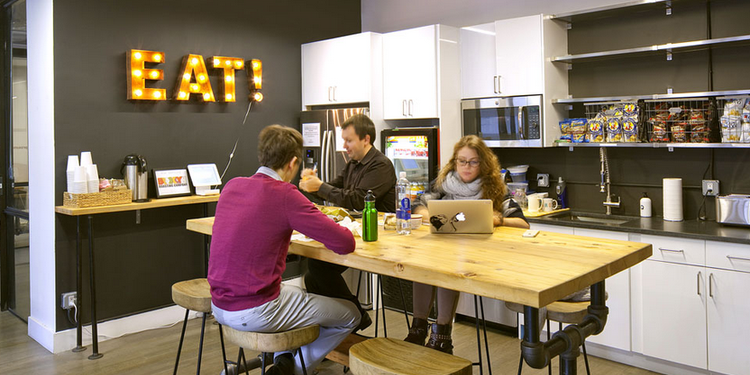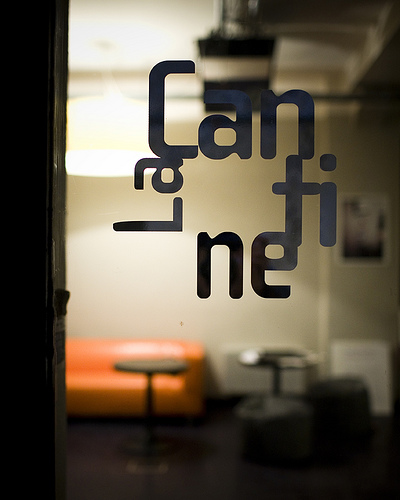Post Author: Michael Gasiorek.

As a startup business owner, have you ever asked yourself how your company can overcome a much larger funded competitor? You may be imagining your competitors using all their capital to hire developers, an aggressive sales team, building out a savvy Mad Men-level marketing department, and getting involved in the next three largest global markets. Can you go up against this Goliath? Yes – and more ably than you’d expect. Our big tip here: using the community and personal attention found at coworking spaces, you can compete with larger businesses by using resources available on-demand at arm’s length from your hot desk.
Aiming to work at the level of a large funded startup? Take advantage of the new corporate office rental model: coworking spaces. Heating up in New York City, the Bay Area, and even in Shanghai, Budapest, and around the world, coworking space allows multiple companies and agencies to share a fully outfitted office. Currently, the largest companies in this space are Wework, a startup with a $5 billion valuation, and Regus, the biggest public competitor.
While there are several competitors in the space, there are only a few with multiple locations. A new privately funded firm is carving out its market share in the rapidly growing business of providing shared office space to startups, entrepreneurs and creative companies in New York City. Coworkrs, a much smaller shared office space community, has locations in Gowanus, Brooklyn, the Flatiron District, and they just recently signed a 13 year 30,000 square foot lease in NYC’s Financial District (Fidi) at 55 Broadway.
As a startup cofounder myself, I was curious about the best coworking spaces from which to work. I got a chance to try a community membership in Wework’s Fulton Center location, and then I tried a community membership at Coworkrs’ Flatiron space. Here is what I learned from the experiences.
What was the Same
Both of these coworking spaces offer more than just space, with options of shared desks or private offices. Expect networking event mixers, arcade video games, high speed internet, free micro-brew beer on tap. The perks and people form a cohesive community that makes these environments more than just workspaces. When you compare either of these companies to the boring corporate office space provider Regus, they are both building and providing an atmosphere that merges work and life. Their cultures are ones that celebrate who we are as people and attracts those who seek to find a sense of purpose in their work. They are bringing several dozen professionals together to build a community where you belong and contribute.
The largest social shifts can happen when an infectious new kind of culture is developed and adopted, where a new set of values change and advance society in a more positive way. By removing the whole corporate office cubicle structure and building a true, interwoven community, I believe they are heading towards a better and more collaborative way to work and live.
What was Different
When I worked at either of the two different Wework locations I felt lost inside their sprawling campus. The community managers did not go out of their way to find out my name, and people were more focused on their work or on interactions with those they already knew. In meeting the Ben Kessler, Wework’s Director of Marketing, I learned about their marketing and customer acquisition strategies. Their employees “sell the why,” targeting mostly startup companies. Despite the fact that they are scaling so quickly, they feel the need to tell their employees to be humble so they can continue to empathize with the small startup customer instead of appearing to be a mega corporation. Wework’s founder Adam Neuberg has publicly said “We are not competing with other co-working spaces.”
When I visited Coworkrs’ flagship Flatiron location, I immediately felt that people were really friendly, especially the community managers. I was greeted by Eric Steiner, the COO, who showed me around and even introduced me to a number of the other members – by name, no less. As I rode the elevator into the space during my trial month, a member invited me to stay for an “Internet of Things” happy hour meetup. Despite being a much smaller coworking space, I got a sense of a family-like community environment. I asked Eric about their marketing strategies. Differing from Wework, Coworks’ staff is vigilant about shared office space competitors like the Grind, Impact Hub, AlleyNYC, The Yard, and others. They admitted to having done intense market research, even speaking with a number of Wework’s former community managers to crystallize strategies to differentiate the space and make it an attractive place to get work done. They even discovered an opportunity in Wework’s Boston location, where the member tenant turnover rate is quite high there because people from Boston have a sense of pride and like to support smaller local coworking spaces over non-local corporate expansions. Coworkrs currently has 4 NYC office locations and they have not taken any outside venture capital investment – all of the funding has come from the cofounders and their immediate networks.
Conclusion
Bigger may not always appeal to your customer base. Does the company that raises the most money or has the largest valuation mean they are the best? Every startup wants to grow, gain more customers and eventually increase revenue, but if you are growing so fast that you are losing sight of the customer experience, this may not be the best strategy for your business. If your business is in an industry that has much larger competitors – which is true in almost every vertical – focus on what makes your company unique and different, focus on your niche product or experience, and your company will compete just fine. Listen to your users and customers and stay authentic to what your brand stands for, and your people will be loyal to you.
This piece was originally published on Startup Grind, the global entrepreneurship community, by Andrew Broadbent.
Andrew covers topics like entrepreneurship, conversion optimization, digital marketing and strategies for the startup and investor community. He co-founded Vab Media, a digital marketing startup agency in New York, with a specialty in the latest SEO tactics. A known growth specialist, he aids companies with branding, visibility, and customer experiences online through a variety of strategies. He builds and optimizes profitable websites, some of which hold first page rankings for major keywords in Google.
